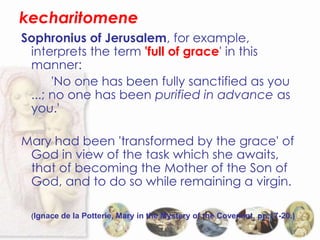According to the Bible, is the Virgin Mary's "Proper Name" Kecharitomene (Full of Grace) & is it tied to her Immaculate Conception & to her Identity?




... There are two passages in Scripture which point us to this truth. We look first at Genesis 3.15, in which we see the parallel between Mary and Eve of which the early Church Fathers already spoke: "I will put enmity between you and the woman, and between your seed and her seed: he shall bruise your head, and you shall bruise his heel." The Jews saw this passage as referring to the struggle between Christ and Satan, and so the Church see in "the woman" a prophetic foreshadowing of the Virgin Mary... This implies an Immaculate conception...
... We can also reason from the text of Lk 1:28, in which the angel calls her "full of grace". If we can validate the translation--we can, and will do so, shortly--then in this verse we can see even more strongly the complete enmity with the serpent--for God's grace is complete opposed to Satan's reign. But if Mary was "full of grace," it seems that she must have been conceived immaculate...
For the Greek word in the Gospel is [full of grace] kecharitomene. It is a perfect passive participle of the verb charitoo. A perfect passive participle is very strong. In addition, charitoo belongs to a group of verbs ending in omicron omega. They have in common that they mean to put a person or thing into the state indicated by the root. Thus leukos means white, so leukoo means to make white. Then charitoo should mean to put into charis. That word charis can mean either favor or grace. But if we translate by favor, we must keep firmly in mind that favor must not mean merely that God, as it were, sits there and smiles at someone, without giving anything. That would be Pelagian: salvation possible without grace. So for certain, God does give something, and that something is grace, are share in His own life. So charitoo means to put into grace. But then too, kecharitomene is used in place of the name "Mary". - The Catholic Monitor
Immaculate Conception: Pope Francis cancels public act of veneration... - Catholic News Agency
Might Francis be downgrading veneration of the Immaculate Conception of Mary who is the highest ideal after Jesus Christ according to Father Maximilian Koble?
"There must be a battle for the highest ideal."
... There are two passages in Scripture which point us to this truth. We look first at Genesis 3.15, in which we see the parallel between Mary and Eve of which the early Church Fathers already spoke: "I will put enmity between you and the woman, and between your seed and her seed: he shall bruise your head, and you shall bruise his heel." The Jews saw this passage as referring to the struggle between Christ and Satan, and so the Church see in "the woman" a prophetic foreshadowing of the Virgin Mary... This implies an Immaculate conception...
... We can also reason from the text of Lk 1:28, in which the angel calls her "full of grace". If we can validate the translation--we can, and will do so, shortly--then in this verse we can see even more strongly the complete enmity with the serpent--for God's grace is complete opposed to Satan's reign. But if Mary was "full of grace," it seems that she must have been conceived immaculate...
For the Greek word in the Gospel is [full of grace] kecharitomene. It is a perfect passive participle of the verb charitoo. A perfect passive participle is very strong. In addition, charitoo belongs to a group of verbs ending in omicron omega. They have in common that they mean to put a person or thing into the state indicated by the root. Thus leukos means white, so leukoo means to make white. Then charitoo should mean to put into charis. That word charis can mean either favor or grace. But if we translate by favor, we must keep firmly in mind that favor must not mean merely that God, as it were, sits there and smiles at someone, without giving anything. That would be Pelagian: salvation possible without grace. So for certain, God does give something, and that something is grace, are share in His own life. So charitoo means to put into grace. But then too, kecharitomene is used in place of the name "Mary". This is like our English usage in which we say, for example, someone is Mr. Tennis. That means he is the ultimate in tennis.
can comprehend it." [https://northwestsvdpstl.org/sites/svdpstlnw/files/uploads/documents/marys_immaculate_conception.pdf]